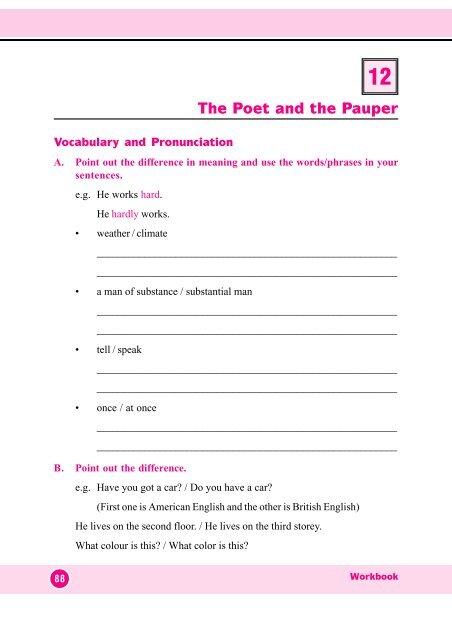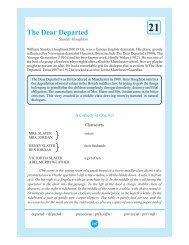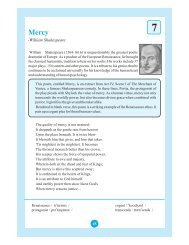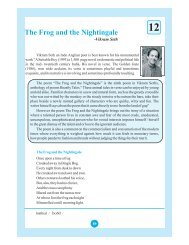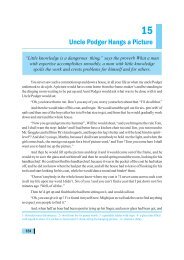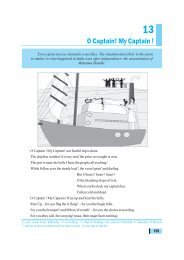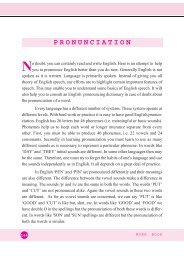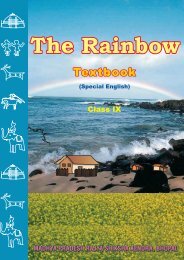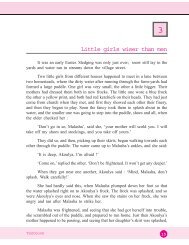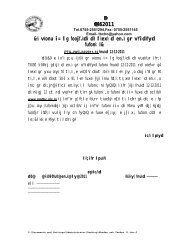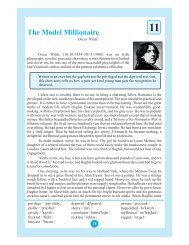R-W-9%20Chapter-12.pdf
R-W-9%20Chapter-12.pdf
R-W-9%20Chapter-12.pdf
Create successful ePaper yourself
Turn your PDF publications into a flip-book with our unique Google optimized e-Paper software.
Vocabulary and Pronunciation<br />
The Poet and the Pauper<br />
A. Point out the difference in meaning and use the words/phrases in your<br />
sentences.<br />
e.g. He works hard.<br />
He hardly works.<br />
• weather / climate<br />
_________________________________________________________<br />
_________________________________________________________<br />
• a man of substance / substantial man<br />
_________________________________________________________<br />
_________________________________________________________<br />
• tell / speak<br />
_________________________________________________________<br />
_________________________________________________________<br />
• once / at once<br />
_________________________________________________________<br />
_________________________________________________________<br />
B. Point out the difference.<br />
e.g. Have you got a car? / Do you have a car?<br />
(First one is American English and the other is British English)<br />
He lives on the second floor. / He lives on the third storey.<br />
What colour is this? / What color is this?<br />
12<br />
88 Workbook
There is no petrol in my car. / There is no gas in my car.<br />
I like biscuits. / I like cookies.<br />
C. Complete the sentence by choosing the second half : The first one is<br />
done for you as<br />
1. What sort of philistine are you, -<br />
esquire?<br />
respected sir?<br />
Mr.?<br />
sir?<br />
2. His teeth -<br />
shiver.<br />
chatter.<br />
loiter.<br />
bitter.<br />
3. I set out job -<br />
haunting.<br />
hunting.<br />
discovering.<br />
inventing.<br />
4. Why stay indoors when there’s such a lovely garden to -<br />
walkout.<br />
walkon.<br />
walk in.<br />
walk up.<br />
✓<br />
Workbook<br />
89
Listening Skill<br />
A. *Listen to the story of a greedy doctor how once he missed a good offer<br />
unfortunately.<br />
Dr. Hubert was famous for his ability and also for his greed.<br />
Once, he cured a child of a grave disease and as a token of her gratitude the<br />
child’s mother presented the doctor with a pretty silk wallet. The woman said, ‘Sir,<br />
I made it myself. Please accept it.’<br />
Shaking his head, the doctor said harshly, “I don’t accept my fees in kind.<br />
Give me in cash.”<br />
The woman felt hurt and humiliated. She asked, “How much should I pay<br />
you?”<br />
“Hundred rupees”, said the doctor.<br />
Without a word, the mother took a hundred rupee note out of the silk wallet,<br />
handed it to the doctor and left with the rest of the hundred rupee notes she had<br />
brought in the wallet to give him.<br />
Make response to the following querries orally.<br />
1. What might the doctor have felt looking at the wallet?<br />
2. Why did the lady feel humiliated?<br />
3. How many notes were there in the wallet?<br />
4. Who was in loss, the doctor or the lady?<br />
5. What would he have thought later on?<br />
6. If you were a doctor what would have you done? Share your views with<br />
your classmates.<br />
Speaking Skill<br />
The following is an example of a conversation on telephone, use it for a mock<br />
talk on telephone. Arrange yourself in pairs :<br />
1. - Hello, is it 2343378?<br />
- Yes please.<br />
* The teacher will read it aloud.<br />
90 Workbook
- Is that Varsha?<br />
- No, it isn’t. May I know who is calling?<br />
- I’m Neha, her friend.<br />
- O.K., I’ll just get her. Hold on please.<br />
- Hello, I’m sorry. She isn’t here. She has just left the place. May I take<br />
your message, please?<br />
- You please tell her that Rani’s birthday is on 23rd of this month.<br />
- O.K., I’ll tell her.<br />
- Thank you. Bye!<br />
- Bye!<br />
Reading Skill<br />
Read the following passage carefully and answer the questions given<br />
below it.<br />
“One of the people who strongly coloured my younger years was the Indian<br />
poet, Rabindranath Tagore (1861-1941). He ranks with Gandhi as one of the great<br />
heroes of India. He was a poet of world-wide stature and the recipient of the Nobel<br />
Prize for literature. An opponent of colonialism, he planted much thought in the<br />
minds of the people of India. For these reasons he was widely praised during the<br />
eighty-one years of his life of creativity and struggle. One of the most impressive<br />
parts of his life in my view is the curse that seems to have fallen on his family after<br />
he devoted his own funds to the establishment of the Shantiniketan School for<br />
peace at Bolpur. One after another, he lost his beloved wife, his second daughter<br />
and his youngest child. Perhaps the poet did perceive a dark shadow of fate that<br />
often fall on human lives. Accepting his own sorrow as a self-imposed trial, he<br />
moved courageously forward along the path of his mission for the peace and<br />
happiness of all mankind. It is this way of life that I commend most highly in<br />
Tagore. A person awakened to his own great mission can overcome grief and use<br />
experience as a springboard to the next stage in a creative life. A first class human<br />
being is not a grumbler.”<br />
Workbook<br />
91
Questions :<br />
(i) ‘the recipient of the Nobel Prize for literature’ implies that :<br />
(a)<br />
(b)<br />
(c)<br />
Rabindranath Tagore owned a prize for his noble deeds.<br />
He was awarded Nobel Prize, the highest form of international<br />
recognition in the field of literature.<br />
He won an award for his honesty.<br />
(ii) ‘an opponent of colonialism’ refers to :<br />
(a)<br />
(b)<br />
Rabindranath Tagore’s struggle against the policy of acquiring<br />
colonies and keeping them dependent.<br />
his fight with those who developed agricultural land into colonies.<br />
(c)<br />
his struggle for the rights of labourers living in unauthorized<br />
colonies.<br />
(iii) ‘Self-imposed trial’ signifies:<br />
(a)<br />
(b)<br />
(c)<br />
a hard and difficult task performed for a big gain.<br />
a task taken up to impress people.<br />
a challenging duty or task imposed upon oneself of one’s own<br />
volition without being forced.<br />
(iv) Rabindranath Tagore ranks with Gandhiji as one of the great<br />
heroes of India because :<br />
(a)<br />
(b)<br />
(c)<br />
He apposed colonialism.<br />
He was a man of strong determination and indomitable courage.<br />
All of the above.<br />
2. Complete the following statements with relevant information given in<br />
the passage.<br />
1. Rabindranath Tagore received the Nobel Prize for_________________.<br />
2. He devoted his own funds for the establishment of______________.<br />
92 Workbook
3. Despite his sorrows and misfortunes, he moved courageously forward<br />
________________________________________.<br />
4. A person awakened to his own great mission can overcome grief and<br />
use _______________________________________.<br />
3. With the help of the information given in the passage, describe<br />
Rabindranath Tagore as :<br />
(a)<br />
(b)<br />
(c)<br />
a literary figure<br />
a nationalist<br />
an educationist<br />
Language Practice (Grammar)<br />
Study these sentences.<br />
Direct<br />
Indirect<br />
: He will say, “I am not at home.”<br />
: He will say (that) he is not at home.<br />
In the direct speech, the words quoted are enclosed within quotation marks<br />
(inverted commas) and separated by a comma from the principal sentence. The<br />
quotation begins with a capital letter. The following rules may be useful in the<br />
transformation of direct into indirect speech.<br />
If the reporting verb is in present or future tense, the tense of the verb in<br />
the reported speech is not changed.<br />
Example :<br />
Reporting verb<br />
(Present Tense)<br />
Reported speech<br />
(Any Tense)<br />
Direct : He has told you, “I am coming.”<br />
Indirect : He has told you that he is coming.<br />
First person pronouns in Direct Speech are changed into pronouns of<br />
the same person as the person of the subject of the Reporting verb.<br />
Direct<br />
Indirect<br />
: You say, “I do my duty.”<br />
: You say that you do your duty.<br />
Workbook<br />
93
If the reporting verb is in the past tense, the verb in the reported speech<br />
changes to any of the four forms of the past tense.<br />
Direct<br />
Present indefinite<br />
Present continuous<br />
Present perfect<br />
Present continuous<br />
Past indefinite<br />
Past continuous<br />
Indirect<br />
Past indefinite<br />
Past continuous<br />
Past perfect<br />
Past continuous<br />
Past perfect<br />
Past perfect continuous<br />
Examples :<br />
Direct : The station master said, “The train is late.”<br />
Indirect : The station master said that the train was late.<br />
Direct : Mohan said, ‘‘I am writing a letter.’’<br />
Indirect : Mohan said that he was writing a letter.<br />
Direct : Neha said, ‘‘I have done my homework.’’<br />
Indirect : Neha said that she had done her homework.<br />
Direct : Ashok said, “I have been studying in this school for two years.”<br />
Indirect : Ashok said that he had been studying in that school for<br />
two years.<br />
Certain adverbs of time and place change as given.<br />
Direct<br />
here<br />
now<br />
this<br />
these<br />
Indirect<br />
there<br />
then<br />
that<br />
those<br />
94 Workbook
ago<br />
today<br />
tomorrow<br />
yesterday<br />
last night<br />
come<br />
before<br />
the same day, that day<br />
the next day<br />
the day before (or the previous day)<br />
the previous night<br />
go<br />
Rewrite the following sentences in indirect speech.<br />
1. He said, “I have done my best and can do no more.”<br />
_____________________________________________________________<br />
2. The old man said, “ My sons, I am dying, I wish you to get all my wealth.”<br />
_____________________________________________________________<br />
3. She said to me, “I thank you for the help you have given me.”<br />
_____________________________________________________________<br />
4. “Do as I tell you at once”, said the teacher angrily.<br />
_____________________________________________________________<br />
5. He said, “Time is up, you can go now.”<br />
_____________________________________________________________<br />
6. I said to him, “I was doing my duty.”<br />
_____________________________________________________________<br />
7. He said, “I shall go there.”<br />
_____________________________________________________________<br />
Workbook<br />
95
Writing Skill<br />
A. Write a story for your school magazine. (50 words)<br />
_____________________________________________________________<br />
_____________________________________________________________<br />
_____________________________________________________________<br />
_____________________________________________________________<br />
_____________________________________________________________<br />
B. Write about the peculiar traits of Kunja Bihari’s personality. (150 words)<br />
_____________________________________________________________<br />
_____________________________________________________________<br />
_____________________________________________________________<br />
_____________________________________________________________<br />
_____________________________________________________________<br />
_____________________________________________________________<br />
_____________________________________________________________<br />
_____________________________________________________________<br />
_____________________________________________________________<br />
_____________________________________________________________<br />
_____________________________________________________________<br />
_____________________________________________________________<br />
_____________________________________________________________<br />
_____________________________________________________________<br />
R<br />
96 Workbook


